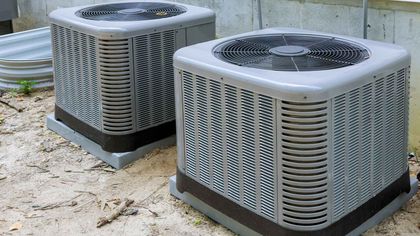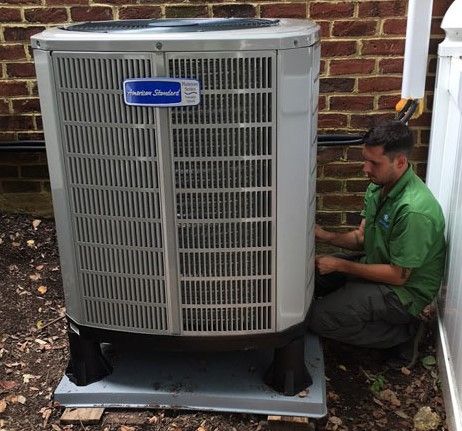Skilled Heating and Cooling Chattanooga Solutions for Your Home or Commercial Needs
Skilled Heating and Cooling Chattanooga Solutions for Your Home or Commercial Needs
Blog Article
Discovering What Are the Necessary Inclusions in Modern Home Heating and Cooling Solutions
In the evolving landscape of home comfort, modern-day heating & cooling services have actually transcended standard arrangements, integrating sophisticated technologies that improve performance and customer control. Smart thermostats, for example, automate temperature level changes based on real-time data, while cooling and heating zoning systems provide customized environment control across various locations of a residence. These advancements not just assure enhanced comfort yet additionally significant energy financial savings (heating and cooling Chattanooga). Yet, the question remains: what other aspects are crucial for optimizing these modern systems?
The Role of Smart Thermostats in Efficient Temperature Level Administration

Smart thermostats play a crucial function in the efficient management of home heating and cooling systems. These gadgets give house owners with the ability to control and check their interior climate remotely using smart device apps or internet interfaces. Boosted with finding out algorithms, smart thermostats can assess a house's heating & cooling patterns and make automated adjustments to optimize power use and comfort. This capacity not only streamlines the procedure of cooling and heating systems however also helps in reducing unneeded energy intake, causing lower energy bills.
Additionally, these thermostats are equipped with sensing units that spot whether areas are occupied, enabling temperature modifications based upon real-time needs instead of fixed routines. The assimilation of smart thermostats with various other clever home technologies, such as voice aides and home automation systems, enhances their utility, making them a main component in the modern-day, energy-efficient home.
Advantages and Implementation of A/c Zoning Systems
heating and cooling zoning systems supply several significant benefits, including boosted convenience and boosted energy efficiency in commercial and domestic buildings - heating and cooling Chattanooga. By enabling various locations of a building to be heated or cooled to particular temperature levels, these systems provide to differing occupant preferences and usage patterns. This targeted method not only guarantees specific convenience but also decreases the general energy usage, as only occupied zones are readjusted to perfect temperatures
Application of a/c zoning includes setting up several thermostats linked to a main control panel, which operates dampers within the ductwork of the heating and cooling system. Each zone's thermostat regulates the opening and closing of these dampers, thus controlling the flow of air to that area and keeping the wanted environment. This system is especially beneficial in multi-level structures where temperature level variants can be a lot more noticable, find out here making it an important component in modern home heating and cooling down services.
Developments in Eco-Friendly and Energy-Efficient HVAC Technologies

Furthermore, advancements in heatpump modern technology Full Report have brought about systems that can give very efficient heating also in colder climates, traditionally a tough location for heatpump. These systems utilize the outdoors air to warm and trendy homes more naturally, lessening dependence on fossil gas and decreasing power intake generally.
Upkeep Tips for Making Sure Longevity and Performance of Modern HVAC Systems
While current improvements have actually significantly boosted the performance and environmental influence of cooling and heating systems, normal maintenance remains critical to ensuring their long life and efficiency. Property owners and center supervisors should focus on routine evaluations to find concerns before they intensify right into costly fixings. It is advisable to read this replace air filters every 3 months or even more regularly in dirty environments to preserve air high quality and system efficiency. Cleansing the condenser and evaporator coils annually is vital to stop decreased heat transfer and increased energy consumption.

Technicians ought to examine refrigerant levels throughout routine service gos to, as improper degrees can dramatically impair system performance. Additionally, making certain that the blower components are readjusted correctly can enhance air movement and boost system performance. By adhering to a rigorous upkeep routine, the operational life of a HVAC system can be extended, and its performance enhanced, inevitably leading to minimized energy prices and a smaller sized ecological impact.

Conclusion
Integrating wise thermostats, Cooling and heating zoning, and environmentally friendly innovations boosts power conservation and indoor air quality. Routine upkeep, consisting of assessments and cleanings, is vital for optimizing system efficiency and expanding its life expectancy.
Smart thermostats, for circumstances, automate temperature level modifications based on real-time data, while HVAC zoning systems offer customized climate control throughout different locations of a residence.HVAC zoning systems supply a number of significant advantages, consisting of boosted convenience and enhanced energy performance in business and domestic buildings.Implementation of Heating and cooling zoning involves setting up multiple thermostats connected to a central control panel, which operates dampers within the ductwork of the home heating and air conditioning system.Structure on the idea of zoning systems that boost energy effectiveness, recent technologies in environmentally friendly A/c technologies have actually taken these principles a step even more (heating and cooling Chattanooga). By adhering to a stringent upkeep timetable, the operational life of a Cooling and heating system can be prolonged, and its efficiency maximized, ultimately leading to lowered energy costs and a smaller sized environmental footprint
Report this page